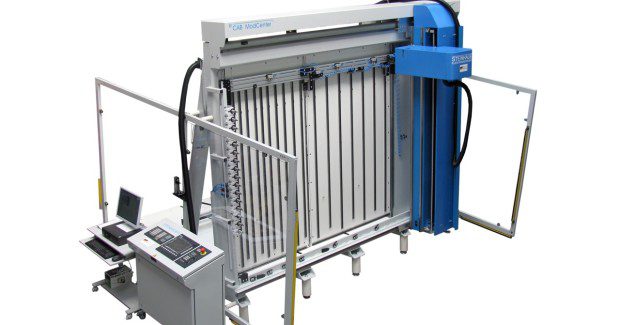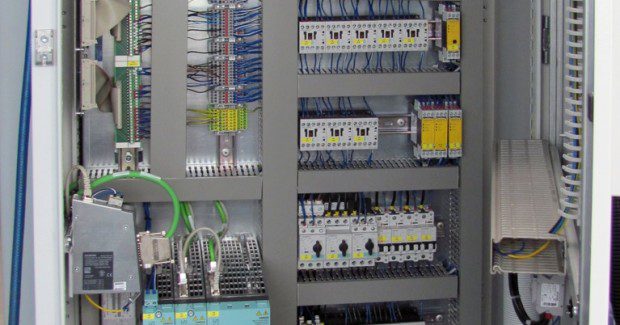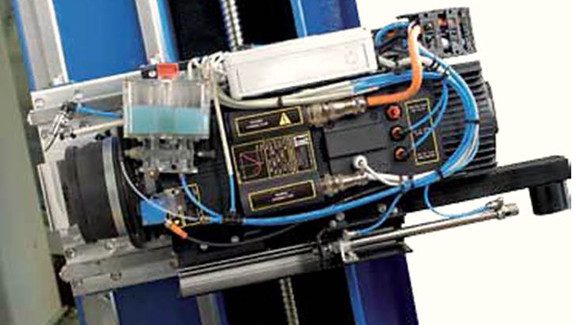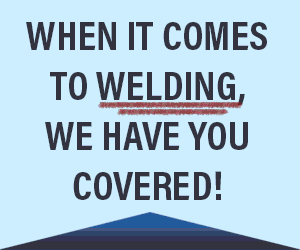Panel Builder Achieves 50 Percent Savings in Time-To-First-Hole Machining
Haewa’s use of the Steinhauer eCAB WorkCenter has resulted in more than a 50 percent savings in that critical “time to first hole in the workpiece” scenario, allowing a substantial increase in the production at the company.
Posted: April 6, 2014
Haewa Corporation (Duluth, GA) has been producing custom enclosures for a variety of applications in many industries since 1986. The company represents the new generation of “metalbending shops” and “panel builders” that have utilized the latest forming and fabricating technologies to radically improve workflow, accuracy and output.
Haewa is the North American operation for an international firm in Germany of the same name. In the U.S., Haewa is led by CEO Clemens Heinrici and occupies a 20,000 square-foot facility, from which it manufactures and markets standard and customized enclosures to system integrators, automation solution providers, in-plant system designers and a variety of OEMs in many industries, including machine building, electrical and electronic equipment.
Haewa’s product offering includes free-standing and modular cabinets, wall-mounted enclosures, cable ducting, climate control systems, fire protection and thermal enclosures plus a variety of highly customized consoles for industrial and even cleanroom environments. The company’s latest development is its patented 180 deg concealed hinge, the first of its kind on the market and fully compliant with UL 508 and UL 50 standards of safety for industrial control and electrical safety equipment. Enclosures and cabinets here are fabricated from steel, aluminum, stainless, galvanized and fiberglass.
Traditionally, such companies would stock a variety of standard enclosures and cabinets, then modify them with hand tools to suit the particular customer requirements. This scenario often causes a bottleneck in the production workflow at the company. At Haewa, this issue was recently addressed with the company’s acquisition of a Steinhauer CNC milling, drilling and engraving machine. Having been a supplier to Haewa in Germany, the companies were quite familiar with each other.
Steinhauer began in the Aachen region of Germany in 1920 and was purchased by the Nagel family in 1983. Today, Hermann and Robert Nagel run the business, which has two branches, one serving the electromechanical repair and retrofit need for local customers and the other being a machine building group dedicated to serving the needs of panel builders worldwide. Steinhauer offers five standard lines of equipment for sheetmetal processing, material cutting for ductwork and mounting rails, wire routing, component assembly and final installation of a control panel into an enclosure. All equipment is marketed under the “Steinhauer eCAB” brand name.
Haewa recently purchased an eCAB WorkCenter for its sheetmetal processing at the Duluth location from Steinhauer. This machine performs machining and engraving tasks, as well as materials handling, all controlled by a Siemens Sinumerik 802D solution line CNC plus Sinamics S120 drives.
As Hermann Nagel of Steinhauer described, “The choice of a hardware-based CNC technology on our machines results in a very flexible, easy-to-learn and very maintenance-friendly machine operation. The specific challenge of our typical panel builder customer is that there are often no specially trained CNC operators on staff, as the classic lathes and mills found in a machine shop are absent at most customers. This means the controls can’t be over-engineered and too complex to be quickly learned and implemented.”
He went on to explain the Siemens advantage on the most critical concern of his customers. “The panel builder lives in the world of ‘time to first hole in the workpiece’ and this results from the fact that the work product quite often comprises unique built-to-order jobs. Therefore, the programming must be done quickly to avoid back-ups during production.”
Haewa’s Heinrici confirmed this is the norm at his company. “We needed the Steinhauer machine to customize our work orders to respond to the very short lead times from most of our customers. That’s the rule, not the exception, for us.” Haewa typically maintains an assortment of standard sizes and configurations of enclosures and cabinets, then modifies them as needed, per job. The machine can process both flat sheetmetal and pre-fabbed boxes. A single, versatile cutting spindle works in tandem with a side-mounted tool magazine to perform all the operations.
As Nagel continued, “Since the panel builder almost never works on the same job twice, the programming on a machine such as the eCAB WorkCenter is a big advantage. The Siemens control can be programmed in less than ten minutes, typically, for new jobs. On older orders, the specifications can be quickly adapted and input on the control (CNC).” Steinhauer customizes the Siemens logic with its own PC software set, tailored to the specific language and machining requirements of the panel builder. Nagel considers this “a very strong CAD/CAM team for our customers, so their programming can be done quite quickly for each job.” He further noted the CNC offered his engineers the ability to customize the control and enhance the functionalities to a great degree.
For Haewa, their use of the Steinhauer eCAB WorkCenter has resulted in more than a 50 percent savings in that critical “time to first hole in the workpiece” scenario, allowing a substantial increase in the production at the company. The machine allows this panel builder to offer its customers various cut-outs for filter fans, air conditioning units, pushbuttons, even threaded conduit connectors, whether positioned on the doors, sides, tops or bottoms of the enclosures. Back panels for consoles can be drilled and tapped, as well.
Functionally, as Nagel elaborated, the eCAB machine is used by panel builders worldwide to cut mild steels, stainless, copper, aluminum, all types of plastic materials including fiberglass and even the hard paper sheeting used for electronic circuit isolation. “With this large assortment of materials and processes needed, the program storage requirements we maintain are quite substantial, so the organization of files is done on a Windows-based format with a Windows file system.”
In a typical job lifecycle, Nagel explained, the first step is planning the simple x/y coordinate work or use of the more powerful CAD functionalities, as both are available on the Steinhauer CAD/CAM system. Next, the workpiece is loaded and the program is activated. Upon completion, the workpiece is unloaded and the next job can start. Owing to the substantial program storage capability and easy language commands on the CNC, fast call-up of particular job specifications is enabled. Plus, as Nagel noted, “the Siemens CNC gives the operator the ability to interrupt, stop and restart a job, if needed. The human machine interface (HMI) is easy-to-operate, self-explanatory and quite powerful.”
Onboard the eCAB WorkCenter, the CNC is operating a three-plus-one axis working tool. The working tool is specially designed for the flat materials processed and the specific enclosure modifications performed by the typical panel builders such as Haewa. The control performs all the various milling, drilling, tapping and engraving processes needed.
Lastly, Nagel commented on the support provided by the control supplier. “One of the major benefits of using the Siemens control and drives package, besides the technical superiority of a hardware-based CNC system, is the service availability all over the world. This helps us convince our customers everywhere that the use of our machines will never pose a maintenance or service problem. Since we calculate the life expectancy of our eCAB WorkCenter machines to be ten years-plus, that’s a big advantage for our customers.”
For more information, contact:
Haewa Corporation, 3764 Peachtree Crest Drive, Duluth, GA 30097, 770-921-3272, Fax: 770-921-2896 [email protected],www.haewa.com
Steinhauer Elektromaschinen AG, St. Jobster Strasse 47a, 52146 Wuerselen, Germany, Phone: +49 2405 46 95 26 [email protected], www.Steinhauer.de
Siemens Industry, Inc., Drive Technologies, Motion Control, Machine Tool Business, 390 Kent Avenue, Elk Grove Village, IL 60007, 847-640-1595, Fax: 847-437-0784, [email protected], www.usa.siemens.com/cnc

















